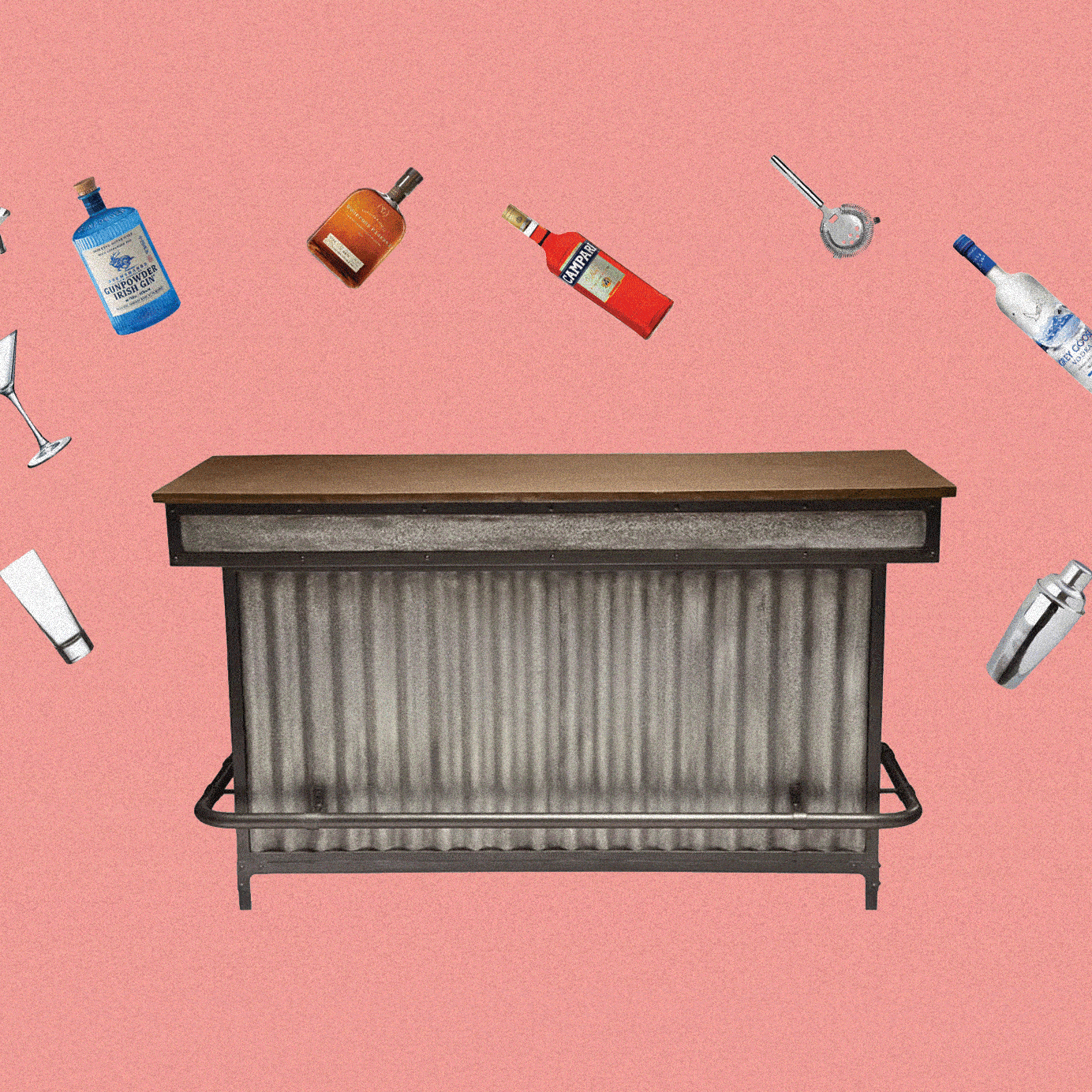Budding bartenders and home bar hopefuls, take note: How you stock your bar is essential to entertaining at home. Luckily, constructing a home bar isn’t as intimidating as it may seem. But there are a few important things to consider before making the jump from one bottle in your freezer, to several spirits, mixers, and tools on display.
To ensure your hard-earned cash is well placed, VinePair spoke to a range of bar industry professionals to seek out the most important tips. Whether you’re buying two bottles or 20, have a strong garnish game or have never used a peeler, all agreed on one central theme. “Buy good quality but don’t go overboard,” Kenneth McCoy, chief creative officer at The Rum House in New York, says. “It’s not about having the most expensive products, but finding what you like. [A] process that should be fun and not bank-breaking.”
Ready to transform your living room into a private speakeasy? Here’s how to set up a home bar, according to professional bartenders.
Spirits
“Variety is the most important consideration when setting up your home bar,” Zachary Pease, owner and beverage director at NYC cocktail hangout My Friend Duke, says. “A home bar is about entertaining, not about what you personally enjoy… so having quality options is a must.”
In other words, bourbon might be your liquor of choice, but if your bar is filled with 20 different bottles of this spirit alone, your cocktail repertoire is quite limited. On the other hand, “If you have white rum, brandy, Scotch, rye, bourbon, and gin, you can make a million drinks,” Erick Castro, co-founder of San Diego mainstays Raised by Wolves and Polite Provisions, says.
Castro advises expanding your inventory slowly and purchasing bottles based on your preferred cocktails. If you focus on one new drink each month and add the spirits and modifiers required to make it, the number of cocktails you can make will increase exponentially, especially when combined with the bottles you already have.
(Castro recommends using apps, such as Bartenders Choice, which list the drinks you can make once you’ve input your ingredients. Of course, there’s always VinePair’s cocktail recipe database, too.)
Mixers & Modifiers
Brooklyn bartender and Leyenda co-owner Ivy Mix believes there are three essential modifiers every bar should stock: vermouth (dry and sweet), Cointreau, and Campari. “Without those components, your home ‘bar’ is just a highball bar,” she says. With them, and a few standard base spirits, you can make a wide range of classic cocktails, including the Martini, Old Fashioned, Negroni, Manhattan, Boulevardier, Margarita, and more.
If you’re not regularly mixing and drinking Negronis or Martinis, Castro suggests purchasing vermouth, which is perishable, in smaller quantities and always storing it in the fridge. Alongside it, you should also stock a good supply of carbonated mixers, like tonic water and Cola. He also suggests buying glass bottles over cans or plastic, as glass retains carbon dioxide (bubbles) better.
Finally, for many classic cocktails, you’ll need a bottle of aromatic bitters. The range of flavored options is ever expanding, but at the beginning, keep things simple with a bottle of Angostura or orange bitters.
Bar Tools and Glassware
When purchasing bar tools and selecting glassware, experts agree simplicity is key.
“Really, you just need a mixing glass, bar spoon, jigger, shaker, and a Hawthorne strainer,” Castro says. He recommends buying from professional suppliers whose equipment is better quality and often less expensive than the fancy-looking utensils high street retailers offer. “If they’re not fit for commercial use, they’re definitely not good for your home bar,” he says.
For Mix, there’s one essential tool no home bar should be without. “Cocktails just don’t taste good without fresh citrus, so a little hand juicer is really invaluable,” she says. A sharp vegetable peeler, meanwhile, is crucial for your garnish game, allowing you to extract clean, attractive twists, while leaving bitter pith behind.
Like bar tools and base spirits, Castro recommends starting your collection small. A couple of attractive coupe, Collins, and Double Old Fashioned glasses are more than enough to get you going, he says. Eventually, you can expand as you need.
Ice
“I can’t overstate the importance of good ice,” Tom Baker, co-founder of Mr. Black Cold Brew Coffee Liqueur, says. Don’t expect to find quality in the freezer tray, though. Instead, Baker says, buy a few two-inch silicone block trays online or at hardware and home stores. Not only are these trays inexpensive, they’ll “dramatically increase the flavor and presentation of your drinks,” he says.
If you’re only mixing cocktails occasionally and don’t typically put ice in your soft drinks, opt for storing ice cubes in Ziploc freezer bags. This way, they won’t pick up any unwanted aromas in your freezer (and your Martini won’t taste like frozen burrito).
Placement
While it shouldn’t necessarily dictate the layout of your kitchen or living room, there are a few factors to consider when it comes to bar cart placement. All spirits deteriorate over time, but keeping bottles away from sunlight and avoiding temperature fluctuations slows the process. “Those things are flavor killers,” Castro says, and nobody wants that.
